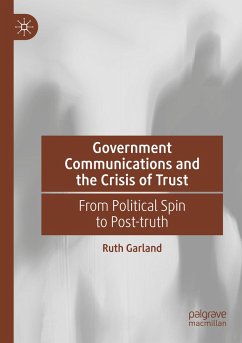This book opens up the black box of government communication during the age of political spin, using archival and official documents, memoirs and biographies, and in-depth interviews with media, political and government witnesses. It argues that substantive and troubling long-term changes in the ways governments manage the media and publicly account for themselves undermine the public consent essential to democracy. Much of the blame for this crisis in public communication has been placed at the feet of politicians and their aides, but they are just part of the picture. A pervasive 'culture of mediatization' has developed within governments, leading to intended and unintended consequences that challenge the capacity of central public bureaucracies to implement public values and maintain impartiality. It concludes that public servants, elected officials and citizens have an important role to play in accounting for governments' custodianship of this most politically-sensitiveof public goods - the public communications function.
Bitte wählen Sie Ihr Anliegen aus.
Rechnungen
Retourenschein anfordern
Bestellstatus
Storno








